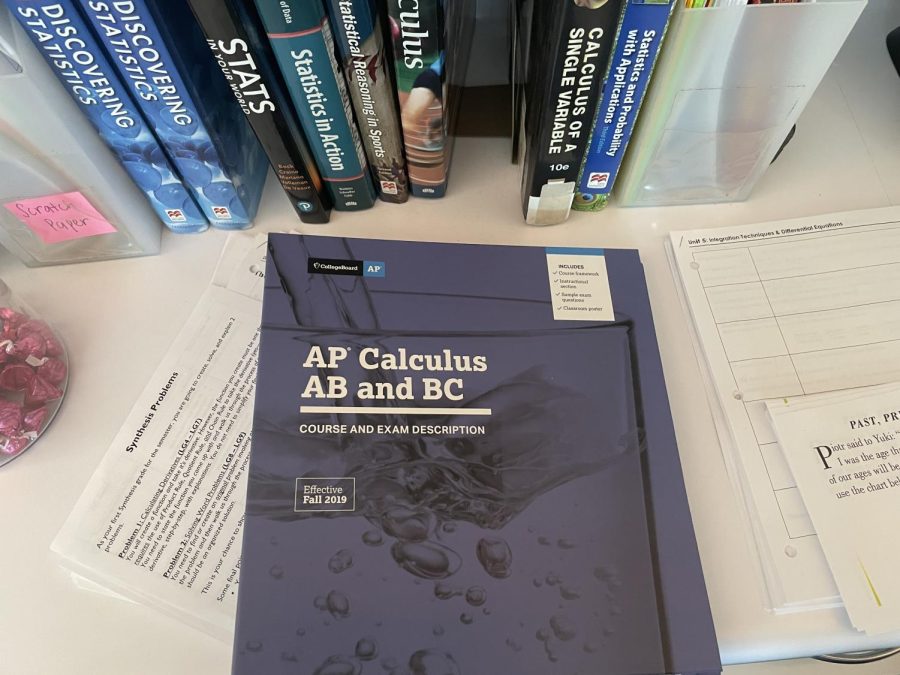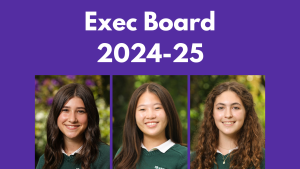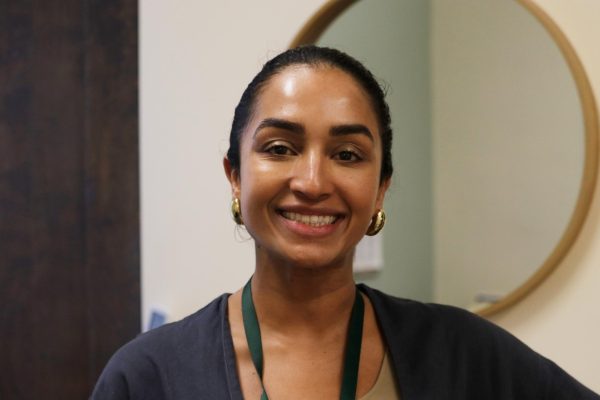‘It allows teachers to teach’: Archer phases out of advanced placement, honors courses for 2022-2023 school year
Photo credit: Thea Leimone
An AP Calculus AB and BC course and exam description binder sits on the desk of math teacher Monica Barragán. The binder details the specific standards and way in which to teach the AP course. Phasing out AP classes will allow teachers to choose their curriculums and teaching pace.
February 15, 2022
Practice free-response questions, thick prep books and multi-hourlong AP Exams will be a thing of the past in the 2022-2023 school year. As January came to a close and students began thinking of their potential courses for next year, the Archer administration announced that Advanced Placement courses will no longer be offered. As a replacement, Advanced Study courses will be available for students looking for a more rigorous class, and will hold the same weight in GPAs and AP classes.
The decision to phase out of the standardized classes comes after a board of all department heads met, discussed, researched and conducted surveys with college admissions and schools that have also phased out of AP courses.
“The decision-making process was a long time in the making,” Director of College Guidance Ivan Hauck said, “Starting … many years ago regarding the science curriculum, recognizing the evolving nature of education at the high school level, the needs of college admissions and what they are looking for, but most importantly, how best to create a robust learning experience for all students.”
The conclusion that the task force came to was that eliminating AP courses allows for more nuanced and in-depth learning, with a curriculum that can be adapted to fit the changing world, and isn’t under a time-constraint for an exam.
“There’s always been a tension in what the limitations of the course and what I saw as the valuable experiences,” English department chair Brian Wogensen said. “I tried to continue to try to manage that tension by expanding the value of the course and diminishing the limitations, but you can only do that so much.”
In preparation for the end-of-year exam, AP courses are centered around learning all of the material and content that will be featured on the test in the spring. Sophomore Amelia Hines said she was glad Archer is making this shift as it encourages students to focus more on understanding the course material, rather than solely trying to memorize it for the sake of the exam.
“I’m really glad that Archer saw that the test was more about rote memorization and taking classes and preparing the actually learning the knowledge or the content and understanding it,” Hines said.
Archer’s science department phased out AP classes approximately 10 years ago, according to longtime science teacher Hanna Robertson, following a similar process and conclusion as the most recent task force.
“We’ve seen a diminishing value in the College Board in general with standardized testing. The same applies for APs. Many colleges and universities don’t allow students to use AP scores to earn college credit, and even if they do, oftentimes, the introductory college level classes still have more breadth and depth of information than anything that high school could provide,” Hauck said. “So oftentimes, it’s still better for the student to take those introductory level classes.”
Before the official announcement from the administration, rumors began circling the school about a change in courses. Students speculated whether AP classes or honors courses would also be eliminated, and how that would affect GPAs.
“I heard initially from rumors and no one knew what was going on. We tried to track down teachers to confirm and it didn’t seem like anyone had the right answer. Especially because there were things circulating not only about APS but about honors as well,” Hines said. “I was just really concerned and confused, and I think a lot of people just overreacted because this is a place where we feel like really safe and it felt like we were being blindsided with all the rumors. But I’m really glad that they shortly sent out an email and followed up because that alleviated a lot of stress.”
The official announcement highlighting course changes and updated offerings was sent out to the Archer community on Jan. 27. The email included an FAQ page and video presentation about the decision process. In addition to this, current eighth through eleventh grade students listened to a presentation detailing the changes as they prepare to submit their course requests.
“I think the more you learn about the kind of the research that we did and the results of that research, the more I think it should ameliorate students concern if their concern is about college admissions. We have lots of evidence that there that’s not an issue,” Wogensen said.
Certain colleges and universities are no longer requiring or accepting AP Exam scores within their applications. Archer is joining the movement with other private schools as they shift away from AP and standardized-based courses. The updated course offerings with still allow students to participate in a rigorous course without the pressure of having to scoring high and earn college credit.
“Colleges don’t always accept the courses for college credit, many students end up repeating the course in college anyway, and you can run the risk of memorizing material for a test versus delving into a subject and exploring it in an enriching way,” Senior Lecturer at Stanford Graduate School of Education said.
An additional seminar will be made available for senior English students, and current AP classes offered at Archer will be reimagined by teachers to create a more enriching curriculum.
“I’ve seen firsthand what it does. It allows teachers to teach. First and foremost, it allows them to create learning environments that help students engage to get excited and thrive,” Hauck said. “It allows so many students to differentiate their own projects and pursue interests and passions in deep ways and allows them to connect their academic in-class learning with all kinds of projects that they are invested inside of Archer.”
Hines said that this phasing out process will allow students to place less pressure on memorizing all of the content within the course, and focus more on exploring personal areas of passion within the subject matter itself.
“I hope that it just offers a space for like minded learners to really dive into the material and the course without the fear of [not] knowing everything for the test … actually getting to explore things that you’re passionate about in that subject area,” Hines said. “I think it’s going to be a really great opportunity.”




















